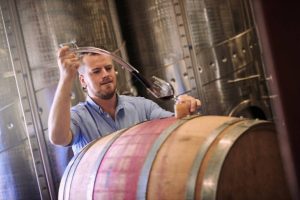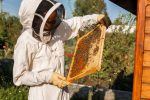| Winemaker Key Stats | |
|---|---|
| Avg. Salary / year | $64,720 |
| Avg. Pay / hour | $31.11 |
| Education | 0-6 Months |
| Job Outlook | 153% |
| Total Employed | 182,320 |
Winemakers, also referred to as Enologists or Oenologists, are professionals who specialize in the production of wine.
Their specialty is in blending wines using their knowledge of grapes and wine production.
Individuals working in the United States mainly work in regions that produce large amounts of wine such as Napa Valley in California.
Individuals who want to become a Winemaker will need the educational background, training and personal skills required to enter this profession.
Some helpful personal skills that will help individuals enter this profession can include: physical stamina necessary with production, persistence as this field can be very competitive and a strong sense of smell and taste to help them determine minor differences between wines.
Go to Page Section:
Education Requirements to Become a Winemaker
Most recently, individuals who want to become a Winemaker are required to attain a minimum of a postsecondary degree in order to enter this profession.
Individuals must also know the slight differences between grapes and the tastes they contribute to winemaking.
In addition, individuals can gain on the job experience by entering the field as a cellar assistant.
Typically, individuals who want to become a Winemaker do not typically need a postsecondary degree to enter this field.
However, it is becoming very common and highly recommended that individuals seek a postsecondary degree.
Individuals are encouraged to attain a bachelor’s degree in food and science technology with an emphasis in enology and viticulture.
Individuals may also attain a bachelor’s in viticulture or enology.
Individuals are encouraged to research colleges and universities with these programs.
If not attending one of these programs, taking classes focusing on agricultural technology, biology, chemistry and sensory evaluation of wine is highly encouraged.
Individuals must also have a strong sense of smell or taste in order to enter this profession.
This may be an innate skill that individual has, or may be something than can be taught.
Individuals can learn this trait by gaining on the job experience through an entry level position such as a cellar assistant.
Individuals may find a job in this position while they are enrolled in school, or pursue this entry level position as a graduate.
Winemaker Job Description
Winemakers use a variety of skills in order to produce wines for mass consumption.
They use their sense of taste and smell as well as their technological background in order to complete this feat.
Using their knowledge of the harvest season, Winemakers will decide when harvesting should begin to gather the grapes needed to create wine.
Winemakers will begin with grape harvest choosing grapes based on acidity, sweetness and moisture.
Using these different characteristics, they will create a variety of wines that appeal to different wine lovers throughout the globe.
Winemakers may also be responsible for the transportation and harvesting processes, depending on the size of the vineyard they work on.
These professionals will monitor the crushing process, the next step after harvesting individually selected bunches of grapes.
The crushing process will create a mixture known as must that is then used as the primary ingredient to create wine.
The winemaker will then add several ingredients to the must that will prompt the fermentation process.
A variety of equipment will be used to complete fermentation and proceed to bottling the wine.
Winemaker Salary and Career Path
Exact salary information for Winemakers is not available; however, salary information for similar professions does exist.
Winemakers can be grouped under agricultural and food science technicians.
In 2012, the median salary for all agricultural and food science technicians, including Winemakers, was approximately $34,070 per year with some individuals earning up towards $53,460 per year.
Many of these individuals work standard full time hours while some are required to travel extensively and have variable schedules.
The job outlook for all agricultural and food science technicians is expected to grow at a slower than average rate when compared to other professions.
Job opportunities for this field are projected to grow at approximately 3 percent through the year 2022.
This growth is attributed to the demand of food production and the efficiency needed for food production and processing.
Food safety regulations and inspections will also increase demand for these professionals.
Using a combination of science and taste testing, Winemakers are responsible for creating a variety of wines for mass production.
These individuals can be involved beginning at grape harvest up until the production and bottling of wine.
The seasonal changes throughout the year can allow these professionals to create a variety of different wines for different occasions and tastebuds.
![]() The below information is based on the 2024 BLS national averages.
The below information is based on the 2024 BLS national averages.
National Average Salary
$64,720Average Salary by State
| State | Avg. Annual Salary |
|---|---|
| Alabama | $63,800 |
| Alaska | $60,810 |
| Arizona | $65,930 |
| Arkansas | $56,450 |
| California | $71,350 |
| Connecticut | $71,630 |
| Delaware | $67,330 |
| District of Columbia | $79,090 |
| Florida | $62,540 |
| Georgia | $57,970 |
| Hawaii | $92,690 |
| Idaho | $54,940 |
| Illinois | $63,360 |
| Indiana | $60,190 |
| Iowa | $48,630 |
| Kansas | $60,920 |
| Kentucky | $51,800 |
| Louisiana | $44,940 |
| Maine | $57,550 |
| Maryland | $64,130 |
| Massachusetts | $75,900 |
| Michigan | $59,170 |
| Minnesota | $63,800 |
| Mississippi | $50,150 |
| Missouri | $62,180 |
| Montana | $58,090 |
| Nebraska | $66,690 |
| Nevada | $62,140 |
| New Hampshire | $61,370 |
| New Jersey | $75,020 |
| New Mexico | $60,750 |
| New York | $70,200 |
| North Carolina | $66,330 |
| North Dakota | $71,280 |
| Ohio | $60,700 |
| Oklahoma | $51,420 |
| Oregon | $63,720 |
| Pennsylvania | $62,500 |
| Rhode Island | $87,950 |
| South Carolina | $64,050 |
| South Dakota | $47,900 |
| Tennessee | $62,210 |
| Texas | $55,130 |
| Utah | $50,400 |
| Vermont | $68,650 |
| Virginia | $62,120 |
| Washington | $71,430 |
| West Virginia | $65,150 |
| Wisconsin | $62,300 |
| Wyoming | $69,510 |
| Guam | $44,800 |
| Puerto Rico | $35,780 |
| Virgin Islands | $67,990 |
The highest-paying state in this field is Hawaii, with an average salary of $92,690.
Here are the five states with the highest salaries in the field:
* Employment conditions in your area may vary.
Frequently Asked Questions
What is a winemaker?
Winemakers, also know as enologists specialize in the production of wine.
They supervise the entire process of winemaking: from grape crushing to the aging process.
Winemakers also supervise the lab technicians who sample the wine to determine when is the right time for bottling.
They are also responsible for supervising the packaging and distribution of wine.
A winemaker must know how to select the grapes and must possess knowledge about the chemistry of fermentation and the wine aging process.
A winemaker also needs a good sense of taste and smell.
Business and leadership skills are also required if you want to have your own winery or to coordinate a team of winemakers.
How much does a winemaker make?
According to the Bureau of Labor Statistics, the average weekly wage for employees working in wineries was $846 in 2016.
How much you will make per year as a winemaker depends on many factors, including your level of experience, your employer and region.
How much does it cost to become a winemaker?
Although there are no educational requirements for winemakers, a bachelor’s degree program in viticulture, enology, food science or a related field can give you the knowledge necessary to work in a winery.
The average out-of-state annual cost for a four-year bachelor’s degree program in enology is around $50,600.
Some community colleges also offer associate degrees and certificate programs in winemaking and related fields.
The Society of Wine Educators offers several certifications in this field, including a Certified Specialist of Wine certificate and a Certified Specialist of Spirits certificate.
Obtaining certification in this field can help you demonstrate your knowledge to a potential employer.
In order to obtain your certification, you will have to pass an exam that consists of 100 multiple-choice questions.
The examination fee for winemakers is around $450-$650.
What is the demand for winemakers?
According to the Bureau of Labor Statistics, employment in wineries was up 153 percent from 2001 to 2017.
The 4,300 wineries that existed in the U.S. in 2017 employed more than 64,000 people.
The number of employment opportunities for winemakers varies by region.
According to the Bureau of Labor Statistics, about 58 percent of all winery jobs in 2017 were in California.
How long does it take to become a winemaker?
Although there are no educational requirements for winemakers, a four-year bachelor’s degree program in viticulture, enology, food science or a related field can give you the knowledge necessary to work in a winery.
Associate degrees and certificate programs in winemaking and related fields are also available at some community colleges.
The Society of Wine Educators offers several certifications in this field, including a Certified Specialist of Wine certificate.
Obtaining certification in winemaking can help you demonstrate your knowledge to a potential employer.
In order to obtain your certification, you will have to pass 100 multiple-choice questions.
Before being ready to supervise the winemaking process you will need some work experience.
You can get a seasonal or temporary position in a vineyard or winery while you complete your education in order to gain some on-the-job experience.














